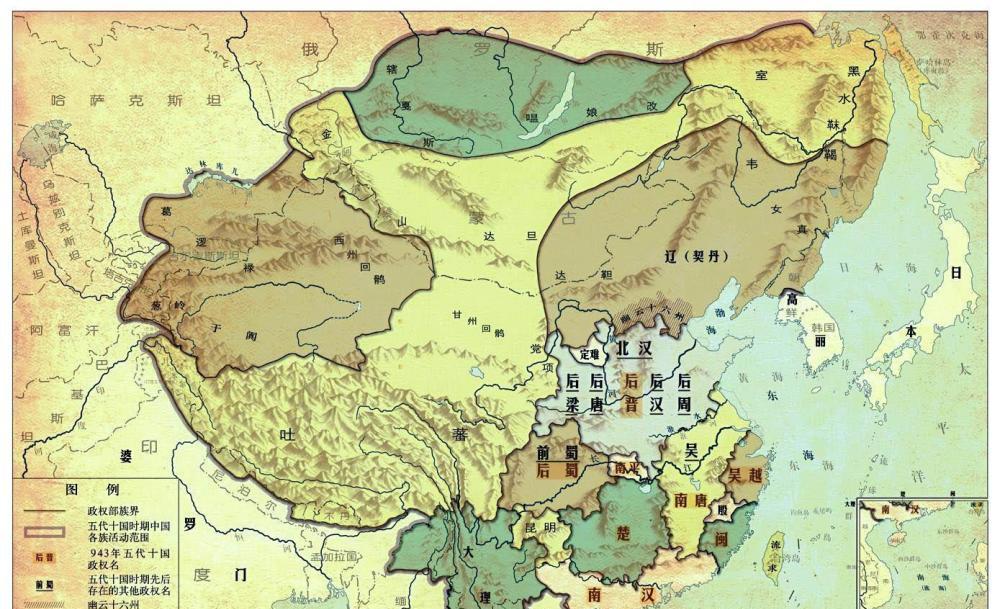As mentioned last time, after the founding of the People's Republic of China, Zhao Kuangyin formulated the basic strategy of unifying the whole country by "first south and then north, first easy and then difficult", and he quickly put it into action -- in the first year of Qiande (963 AD), he successively eliminated Nanping and Wuping, which divided the south. Then he aimed his spearhead at the wealthy Hou Shu. In the second year of Qiande (964 AD), Zhao Kuangyin sent the general Wang Quanbin to command an army of 30,000 to the south, and the expedition of the Great Song army was surprisingly smooth - it took only sixty-six days to destroy the Later Shu regime!

After the Later Shu monarch Meng Chang surrendered, the Northern Song army was ordered to escort him north to Beijing, but on the way there was a surprising scene - "all the people embraced the road, crying and crying, and Chang covered his face with a song." From Erjiang to Meizhou, there were hundreds of people mourning along the road" (Northern Song Dynasty Zhang Tangying's "Shu Han Zhuo"), that is, tens of thousands of Hou Shu remnants risked killing their heads and spontaneously went to Meng Chang's northbound route to send him off, they were heartbroken by the emperor's capture, and even hundreds of people fainted due to excessive sadness.
Judging from the matter of the people's send-off, although Meng Chang had perished, he was at least a last emperor who won the hearts of the people. Although the Battle of Houshu lasted only sixty-six days after the Northern Song Dynasty, it later took more than two years to quell the rebellion—soon after Meng Chang surrendered, Wang Quanbin ordered the execution of 27,000 Hou Shu soldiers (Jia Chen, sent the imperial city to send Dou Siyu to meet Lao Mengchang... Gengshen, Wang Quanbin killed 27,000 Shu soldiers in Chengdu), and because the Song Dynasty army rebelled against Houshu, it triggered a major uprising (in the month of the month, the thieves of the two rivers rose up, and the vanguard commanded Gao Yanhui to die, and the zhao was attacked).
After Meng Chang arrived in Beijing, Zhao Kuangyin sent his younger brother Yin Zhao Guangyi of Kaifeng Province to receive him, and then personally received him at the Chongyuan Temple, but only seven days later, Meng Chang died mysteriously (Yi Hai, sent Kaifeng Yin Guangyi to Meng Chang in Yujin Garden. Chengjiao, see Meng Chang in the Chongyuan Hall, Feast Chang is equal to the Daming Hall. Nongchen, Yan Mengchang and his disciples in the Great Ming Hall. In June, With Meng Chang as zhongshu ling and duke of qin, Chang's sons and sons had a bad job. Geng, Meng Chang. In the autumn of July, Meng Chang was posthumously named king of Chu), and there is no record of the cause of his death in the history books.
In the existing "History of the Five Dynasties" and "History of Song" and other canonical histories, Meng Chang was a faint and incompetent monarch, such as the "History of Song" said that "Xichuan Meng Chang was endowed with no degree", and was pro-Yu chen, yuanxian chen. However, for thirty-two and a half of the thirty-three years of the later Shu dynasty, Meng Chang was in power—Gaozu Meng Zhixiang died after only half a year on the throne. There are not many examples of Meng Chang left in the history books, but sixteen characters were carved and erected in all the gates of the country in the next thousand years or so, which is: "Erzhu Erlu, the people anoint the people;the people are easy to abuse, and the heavens are difficult to deceive!" These sixteen words are what later generations call the "Ring Stone Inscription".
Judging from Meng Chang's popularity with the people and his ability to write the Jie Shi Ming, he should not be a tyrannical emperor, and during his reign, Hou Shu almost did not break out rebellion, while after the Song Dynasty ruled Hou Shu, there was first a rebellion led by Quan Shixiong that lasted for more than two years, and then a rebellion led by Wang Xiaobo and others that lasted for more than three years, resulting in the proverb that "the world is not chaotic before Shu is in chaos, and the world has been ruled by Shu has not been ruled". These two turmoils were unprecedented in the entire history of the Northern Song Dynasty, which also confirmed that Meng Chang would not be the emperor of the future.
Then, after the "Kingdom of Heavenly Palace" Hou Shu was recovered, where did Zhao Kuangyin point his sword? If you want to know what happens next, please pay attention to the next lecture on the "Compendium of the Eighteenth Emperor of the Song Dynasty", "Sexual openness is like a captive drinking duck".